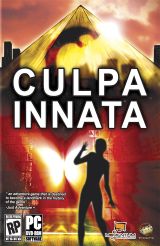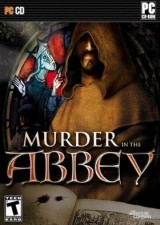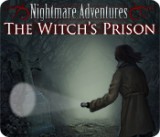Review for The Forgotten City
The Forgotten City began its life as a mod for The Elder Scrolls: Skyrim that was so popular it was downloaded over three million times. So it only made sense for indie developer Modern Storyteller to revamp and upgrade it into a standalone game, and I’m happy to say that the result is a fascinating mystery adventure, regardless of whether you’re familiar with the mod on which it’s based. Set in a cursed city of ancient Rome, it features strong voice performances, beautifully detailed visuals, terrific writing, and a fun time-looping conceit that not only makes for a great gameplay experience, it will leave players pondering the questions it raises about authority and morality.
You wake up near the Tiber River with no memory. The hooded stranger who found you unconscious asks if you wouldn’t mind going into the Roman ruins nearby to find a man named Al. You oblige, and after taking a moment to customize your character’s gender, skin tone, name, and background (Archaeologist, Soldier, Fugitive, Amnesiac, each of which has its own strengths and weaknesses), you step inside and immediately fall through the floor into a pool of water under the city. Before long you find Al, who has been transformed into a golden statue and hanged by the neck. An inscribed stone tablet from Al warns you against venturing further; he tried to set things right, but he failed and he’d rather not have someone else meet the same fate.
At the same time, whispered voices beckon you closer to the portal that lies beyond what remains of Al. Paying no heed to the dead man’s admonishment, you recklessly venture forth and suddenly find yourself in an ancient Roman city. Galerius, the first person you meet, gives you a warm welcome and another warning: the city is cursed by the Golden Rule, which states that if anyone in the city commits a sin, all 23 citizens living here will be turned to gold. Soon after you encounter the city’s Magistrate, who tells you that he completed a ritual that opened a doorway in time in the hopes that someone from the future could come and save the city from its inevitable demise. Your arrival means that someone is about to break the Golden Rule, and he asks for your help in figuring out who it will be—and stopping them before it’s too late.
The game uses a first-person perspective and the standard controls you’d expect: WASD to move, shift to run, mouse to look around and interact with things—and to use a bow and arrow in a few sequences. There is also controller support, which worked just as well in the brief period I experimented with it. There’s no in-game map, but there is a menu that will activate quest markers showing the direction and distance of your next task. Additionally, pressing the “X” key will show the way toward your next objective with a trail of ethereal white butterflies. While that is very helpful, I still would have liked some way to see where characters are at a given moment, since you’ll spend a lot of time going back and forth between them over the course of the five or so hours it will take to reach the best, canonical ending. A Citizen Register you find helps with this, as it lists the game’s cast alongside their work and home locations, but they’re not always there when you need them.
Solving the mystery of who is going to break the Golden Rule largely involves talking to people, exploring their abodes and shops, and reading notes and letters they’ve left behind—all the usual story-driven adventure game hallmarks. There is a bit of light dexterity required at times (simple platforming, a few moments calling for speed, the aforementioned archery), but despite originally deriving from an RPG, this is not a combat-focused game whatsoever, and every conflict between characters can be solved by talking it out. You can die, but the game autosaves frequently and you can save manually as well, so I never lost much progress when I accidentally wandered off a cliff or took a jump from a building that was just a little too tall. You’re generally free to explore, interrogate, investigate, and come to your own conclusions at your leisure.
There’s one other major gameplay element of importance: the time loop. Until you solve the mystery, you’re stuck in a cycle that resets every time the Golden Rule is broken sometime that same day. However, allowing the loop to reset is not only fine but often necessary to progress. You get to keep your inventory each time it happens, but the characters don’t remember your previous actions or conversations. Fortunately, The Forgotten City avoids tedium by giving you dialogue options to skip past the conversations you’ve already had, and you can ask Galerius to perform certain tasks on your behalf once you’ve completed them yourself in past loops, saving you from having to repeat the same steps each time. Cleverly exploiting this time loop is a key part of your detective work, and it’s a lot of fun to play with.
While the gameplay is certainly enjoyable, it’s the writing that makes the game something special. The story is gripping, with a number of clever twists and turns that I won’t spoil here, but even the smaller character interactions and backstories are written with wit, heart, and a sense of humor. I found myself truly involved in the lives and well-being of the city’s inhabitants, eager to reset the loop as many times as necessary to save them. Kind Priestess Equitia, slimy con artist Desius, clever medic Lucretia—they’re not always likeable, but I found myself interested in almost all of their tales. The game is a bit too short to fully detail the backstories of all 23 citizens, but the developers wisely chose to tighten their focus rather than spreading themselves too thin, and even those without significant story arcs add depth and life to the world.
In addition to the central story there are side quests, but I hesitate to even call them that—they’re often necessary to get the best ending, and absolutely none of them feel like padding or busywork. Many even have high stakes, like the quest that asks you to stop a suicide pact between lovers, or the one about finding the Magistrate’s adopted daughter and getting to the bottom of her disappearance. There’s an optional quest that comes with a brief warning for players uninterested in horror or action elements, though I would highly encourage everyone to play through it. It’s creepy and there’s some combat, but mostly it offers more context and backstory that you won’t want to miss.
The terrific writing is brought to life by voice-overs with no real weak link. The actors for every character, from the cryptic old woman Livia to the kind-hearted Galerius who greets you as you enter the city, give nuanced, effective performances. I doubt I would have had as much of an emotional reaction to the various plot developments and character interactions if they weren’t so well acted. The orchestral score is similarly effective—appropriately eerie and subtle at most points, grandiose when the plot calls for it. It never sounds out of place for the ancient Roman time period, with haunting choral arrangements and dramatic strings that feel epic but never overbearing.
Visually, The Forgotten City looks gorgeous. The developers boast of “historically authentic art, architecture, costumes and customs,” and while I can’t personally vouch for its accuracy, I can attest to how detailed and beautiful it all is. In addition to the lovely vistas of the city itself, surrounded by rocky cliffsides and vertigo-inducing heights, a lot of care has been taken in the depictions of Roman shrines, temples, houses, and markets—and that’s without even mentioning the eerie caverns throughout and underneath the city. From the creepy golden statues scattered around the city (remnants of previous groups of citizens that failed to abide by the Golden Rule) to the numerous nooks and crannies waiting to be discovered, the environments are as immersive as they are uniformly stunning. It really feels like getting to step back in time and living out history. Some of the character animation is a little stiff, especially facial, but at no point did it ever take me out of the story or break the mood. Overall it’s near-AAA-quality stuff, especially impressive considering the three-person development team behind it.
Thematically, there’s a lot to think about here. I appreciated the way The Forgotten City tackles concepts of morality and authority: Who determines what is or isn’t a sin? Are we truly good people if we’re only doing the “right” thing out of fear of punishment? The Golden Rule applies in obvious ways—no stealing, no killing—but there are situations where the definition of what is or isn’t a sin makes little sense. Is it not a sin to price-gouge for life-saving medication, as one of the characters does? What about harassment to influence the outcome of an election? The numerous real-life parallels don’t go unremarked upon by the protagonist, and I enjoyed a particular conversation comparing ancient debt bondage to the uncomfortably similar modern-day reality of student loans and the like. There are no easy answers, and the game doesn’t try to offer any. I admired its willingness to confront philosophical and ethical dilemmas intelligently—and to tie them to present-day issues in a thought-provoking way.
There are a good number of dialogue options and ways to go about solving each quest, leading to four possible endings. One in particular is clearly the intended outcome, and it’s absolutely worth playing until you reach that point. I imagine replay value will mostly come in the form of experimenting with different approaches and responses during conversation, as the other three endings merely branch off from the main path at key decision points. Just save before you do anything drastic—you’ll know when. I was a bit disappointed at how little my own character’s chosen backstory ended up mattering (choosing “Archaeologist” gave me some additional historical insight; “Fugitive” slightly increases the protagonist’s movement speed), but then this game was never meant to be an RPG—not even when it was a mod for an RPG.
The Forgotten City is a truly excellent mystery adventure. Like the best games of the genre, it gives you the freedom to investigate, explore and make choices on your own terms, while the quality of the script will have you fully invested in getting to the bottom of the Golden Rule breaker and saving these doomed people, day after looping day. There’s perhaps a bit too much backtracking or searching for moving characters at times, but these are minor quibbles in what is otherwise an excellent game. Added all together, the gorgeous visuals, smart writing, engaging investigative gameplay, effective music and nuanced voice acting make The Forgotten City an experience you won’t want to miss.




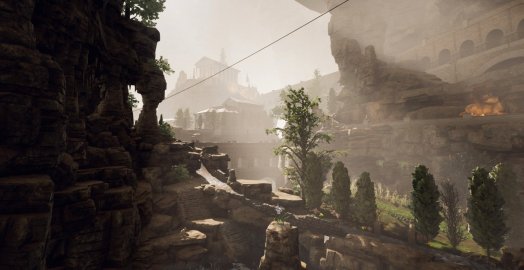
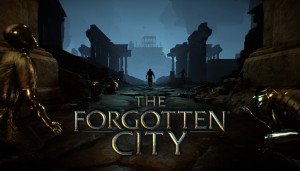
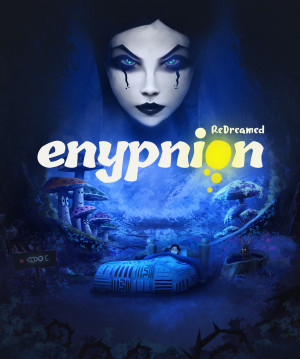




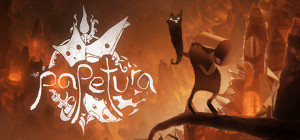


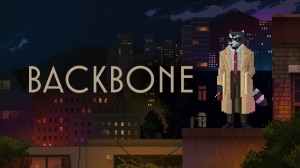
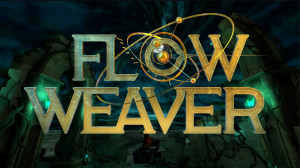
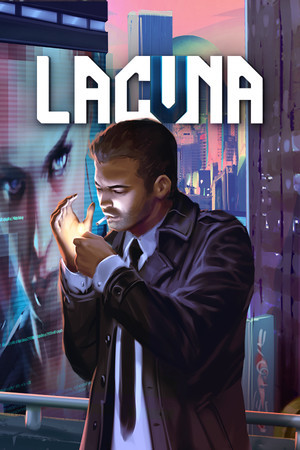
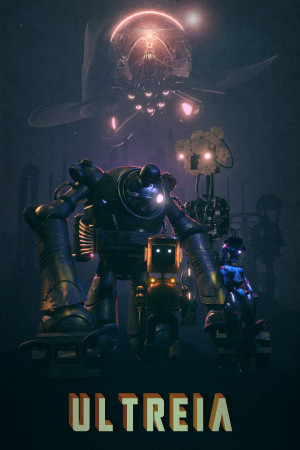

__medium.jpg)
